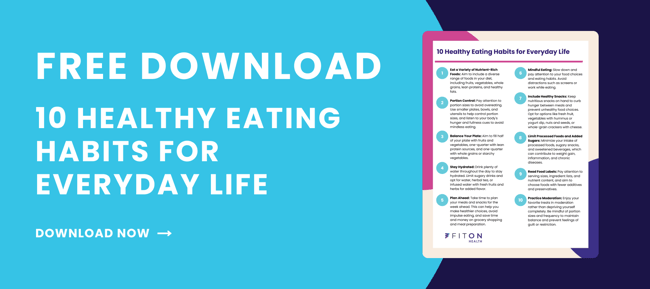By embracing food as medicine and prioritizing healthy eating habits, you can unlock the transformative power of food.
In the pursuit of health and well-being, it’s easy to overlook one of the most powerful tools: food. Nutrition is a key piece of employee well-being - just like physical activity and mental health. It’s no secret that the U.S. has a nutrition problem - with less than 1 in 10 adolescents and adults eating enough fruits or vegetables, 9 in 10 Americans consuming too much sodium, and 42% of adults having obesity, putting them at risk of heart disease, type 2 diabetes, and some cancers. Beyond merely satisfying hunger, food holds the potential to heal, nourish, and fortify your employees’ bodies against illness and disease.
Recently, the shift towards viewing food as medicine is gaining momentum, with individuals and health providers alike recognizing the profound impact that nutrition can have on overall health outcomes. While nearly $173B a year is spent on healthcare for obesity, researchers and representatives are coming together to ignite new “Food Is Medicine” initiatives.
Read on to explore how attitudes towards food and health are evolving, the crucial role of promoting nutritional health, and the transformative potential of health and wellness programs like FitOn Health in supporting holistic well-being through nutrition.
What is food as medicine?
Food as medicine, also known as “food is medicine” is the connection between food and health. It’s the concept that recognizes food and nutrition play a crucial role in overall health. As part of food as medicine efforts, various approaches have been put in place with the goal to to end hunger and reduce the prevalence of chronic disease in the United States by 2030. This shift in mindset is fueled by a desire for preventive healthcare, to better support individuals proactively seeking to optimize their well-being through nutritious eating habits.
Understanding cultural and socioeconomic factors with nutrition
While the benefits of a nutritious diet are universal, access to healthy food options is not always equitable. Cultural norms, traditions, and socioeconomic factors can significantly influence dietary habits and food choices. Recognizing these disparities is crucial in developing targeted interventions aimed at addressing barriers to healthy eating within diverse communities and workforces.
Vulnerable populations, including low-income individuals, are disproportionately affected by food insecurity and dietary-related health disparities. Initiatives focused on nutrition education, outreach, and food assistance programs play a vital role in addressing these inequities. By providing resources and support tailored to the specific needs of your workforce or clients, you can empower individuals to make healthier choices and ultimately improve their overall well-being.
The impact of nutrition on health outcomes and healthcare costs
The impact of nutrition on health outcomes cannot be overstated. A diet rich in fruits, vegetables, whole grains, and lean proteins has been shown to reduce the risk of chronic diseases such as obesity, diabetes, and cardiovascular disease. Nutritional interventions can play a significant role in managing existing health conditions, accelerating recovery, and even reduce potential hospitalization time. By prioritizing nutrition as a cornerstone of healthcare, it will not only improve individual health but also alleviate the burden on healthcare systems and reduce healthcare costs.
Whether you’re an employer looking to support your workforce population with a wellness strategy or searching for a health plan offering supplemental benefits, here are a few ways you can make a significant impact on overall well-being with nutritional health.
5 Ways to support employee well-being and encourage healthy eating habits
From improving employees' overall health, to tackling weight management and increasing energy levels, incorporate these healthy habits to help support your employees' nutritional goals and well-being.
1. Provide healthy snacks and meal options
For companies back in the office, ensure that the workplace offers a variety of nutritious snacks and meal options, including fresh fruits, vegetables, whole grains, lean proteins, and healthy beverages. By making healthy choices readily available, employees are more likely to opt for nutritious options throughout the day.
2. Nutrition education and courses
Offer nutrition education workshops, courses, or programs with registered dietitians or nutritionists. With a benefit like FitOn Health, these digital sessions can provide employees with personalized guidance on making healthier food choices, understanding portion sizes, and planning balanced meals to meet their individual nutritional needs.
3. Encourage mindful eating practices
Promote mindfulness around eating by encouraging employees to take regular breaks for meals, eat away from their desks, and consume their food slowly. Providing designated areas for dining and relaxation can help create a calm and conducive environment for mindful eating practices.
4. Incorporate wellness challenges
Organize wellness challenges focused on nutrition, such as tracking daily vegetable intake, trying new healthy recipes, or participating in a sugar reduction challenge. These challenges can foster camaraderie among employees, provide motivation for healthy eating, and offer opportunities for peer support and accountability.
5. Support physical activity
Just like mental health, recognize the symbiotic relationship between nutrition and physical activity by integrating opportunities for movement into the workday. Encourage employees to take active breaks, participate in fitness classes or walking meetings, and provide incentives for engaging in physical activity. By promoting a holistic approach to wellness, employers can support employees in maintaining healthy eating habits and active lifestyles, ultimately leading to improved well-being and reduced healthcare costs.
How health plans can be partners in promoting nutritional health
When employers are searching for the right health plan to offer their population, health plans play a pivotal role in shaping attitudes towards nutrition and fostering healthy habits among their potential members. Offering a supplemental benefit that empowers individuals to make informed choices about their diet provides positive reinforcement, encouragement, and evidence-based guidance that can make a big impact. Holistic strategies tailored to employers’ unique circumstances helps them support their employees in overcoming barriers and embracing a healthier lifestyle. It’s a win-win for everyone.
FitOn Health: A holistic approach to nutrition and well-being
FitOn Health embodies a holistic approach to nutrition and well-being, recognizing that true health encompasses not only physical fitness but also mental and emotional wellness. Through personalized nutrition plans, educational resources, and community support, FitOn Health enables individuals to take control of their health and cultivate lifelong habits that support their goals. By prioritizing balance, moderation, and sustainability, FitOn Health equips participants with the tools they need to thrive in every aspect of their lives.
As the intricate relationship between food and health continues to evolve, it's clear that nutrition plays a central role in fostering optimal well-being. By embracing food as medicine and prioritizing healthy eating habits, you can unlock the transformative power of food to heal, nourish, and energize your employees' bodies and minds. Together, let's work towards a future where everyone has access to the resources and support they need to live their healthiest, happiest lives.
Ready to support your people in their wellness journey? Schedule a demo today to learn how FitOn Health can help!
Never miss a beat


